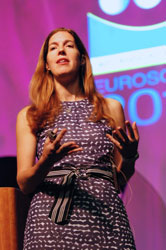Distinguished Neurobiologist Leslie Vosshall to Discuss Courtship and Copulation in the Fly at Forbes Lecture, July 18

Woods Hole, MA—Renowned molecular neurobiologist Dr. Leslie B. Vosshall will discuss her research, which focuses on sexual behavior in the fly, Drosophila melanogaster, at the Forbes Lecture Thursday, July 18. The lecture, supported by The Grass Foundation, is titled “Time for Love: Courtship and Copulation in the Fly,” and will be held at 8:00 PM at the Marine Biological Laboratory (MBL) Lillie Auditorium, 7 MBL Street, Woods Hole.

Sexually reproducing animals engage in a series of courtship rituals that precede copulation. Dr. Vosshall's laboratory studies sexual behavior in the fly from two points of view. First, they are interested in female sexual receptivity—how and when and why the female expresses an interest in the male. In many species, it is the female who controls mate choice, but this problem has received little attention in this genetically tractable insect. Dr. Vosshall's group have uncovered a small group of neurons that govern whether or not a female fly will consent to mate with an interested male fly.
Second, Dr. Vosshall is interested in the precise timing of copulation, a behavior that is controlled by the male fly. Across sexually reproducing animals, copulation duration is conserved within a species, but differs dramatically in length between species. Rabbits will copulate for less than 2 seconds, while praying mantises copulate for more than 2 hours. What mechanisms regulate the duration of this important reproductive behavior? The male fly copulates for about 25 minutes. Dr. Vosshall and her colleagues have found a small group of male-specific neurons that govern this timing. If the neurons are turned off, mating last for hours, but if the neurons are hyperactivated, copulation ends before 10 minutes. They hypothesize that this timing mechanism is in place to assure that copulation lasts long enough to assure full fertility.
Dr. Vosshall is the Robin Chemers Neustein Professor at The Rockefeller University and a Howard Hughes Medical Institute Investigator. She received an A.B. from Columbia University and a Ph.D. from The Rockefeller University. Following postdoctoral training, she returned to Rockefeller in 2000 as an assistant professor. She was promoted to associate professor in 2006 and was named Robin Chemers Neustein Professor in 2010. She was appointed a Howard Hughes Medical Institute investigator in 2008. Dr. Vosshall has been a faculty member of the MBL Neurobiology and Neural Systems and Behavior courses. Her awards include a Gill Young Investigator Award in 2011, a Dart/NYU biotech award in 2010, a Lawrence C. Katz Prize from Duke University in 2009, and a Blavatnik Award for Young Scientists in 2007. In 2005 she received the New York City Mayor’s Award for Excellence in Science and Technology and the Irma T. Hirschl/Monique Weill-Caulier Trust Research Award.
About the Forbes Lectures:
Since 1959, the special two-part Forbes Lecture has been supported by The Grass Foundation, a private foundation that supports research and education in neuroscience. The lectures are given in honor of pioneering neurobiologist Alexander Forbes. Traditionally, the Forbes lecturer also spends several weeks at the MBL, working alongside the Grass Fellowship Program.